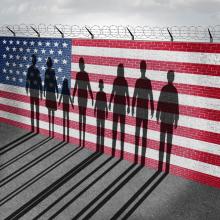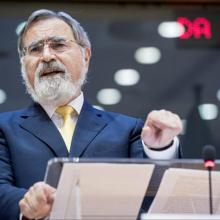U.S.
During his early morning visit to the Vatican, Trump will also meet the secretary of state, Cardinal Pietro Parolin, and Archbishop Paul Gallagher, who is responsible for the Holy See’s relations with states.
For the first time, a majority of Americans has voiced concern about violence against Jews, polling by the Anti-Defamation League shows.
While 52 percent of Americans surveyed said they are disturbed about such violence, an even higher percentage — 76 percent — said they are concerned about violence against Muslims.
The financial rating firm said on Thursday that an analysis of 10 large so-called sanctuary jurisdictions found the Justice Department funds made up on only 0.2 percent of budgets, on average.
Rabbi Jonathan Sacks made a name for himself as chief rabbi of Great Britain for nearly a quarter-century, a time of great tumult that included the Sept. 11, 2001, attacks, the influx of millions of Muslims into Europe, and the ongoing pressures to absorb and assimilate newcomers into a mostly secular society.
As chief rabbi, from 1991 to 2013, he stressed an appreciation and respect of all faiths, with an emphasis on interfaith work that brings people together, while allowing each faith its own particularity.
In a major setback for the pope, Collins on Mar. 1 announced that she had resigned from the Pontifical Commission for the Protection of Minors, established by the pontiff in 2013 to counter abuse in the church.
She said the pope’s decision to create the commission was a “sincere move,” but there had been “constant setbacks” from officials within the Vatican.
“There are people in the Vatican who do not want to change, or understand the need to change,” Collins said in a telephone interview from Dublin.

Image via Nebojsa Markovic / Shutterstock
Real people, with real stories, and real families are trembling in fear for the future of their families and, in some cases, their own lives. For those of us who follow Jesus, our faith must inform our citizenship — not the inverse. It's time for us to ask better questions, seek deeper understanding and accompany our neighbors— whether local or global — who are navigating the scariest moments of their lives.

Image via Ken Rowland/flickr.com
More than 800 congregations have declared themselves sanctuaries for undocumented immigrants, about double the number since Election Day.
Leaders of the sanctuary movement say the pace of churches, and other houses of worship, declaring themselves sanctuaries has quickened, in the days leading up to the inauguration of President-elect Donald Trump on Jan. 20.
Canadian researchers are revisiting a hotly debated sociological question: Why do some churches decline while others succeed?
Since the 1960s, overall membership in mainline Protestant Christian churches has been dropping in both the U.S. and Canada.
But some congregations have continued to grow, and a team of researchers believes it now knows why. It’s the conservative theological beliefs of their members and clergy, according to researchers from Wilfrid Laurier University and Redeemer University College in Ontario.

Image via Lightspring/Shutterstock.com
On Nov. 14 the U.S. Conference of Catholic Bishops asked President-elect Donald Trump to implement policies geared toward honoring the humanity of immigrants and refugees, reports the Associated Press. The Roman Catholic bishops made their call to President-elect Trump at the beginning of their annual meeting in Baltimore.
In an interview conducted on Nov. 7, on the eve of the election, and published Friday by an Italian daily, the Argentine pope declined to make any judgment about Trump.
“I do not judge people or politicians,” the pope told Eugenio Scalfari of La Repubblica when asked what he thought of Trump. “I only want to understand what suffering their behavior causes to the poor and the excluded.”
Even by this pope’s standards it was a bold move.
Francis, the spiritual leader of more than a billion Roman Catholics across the globe, this week traveled to Sweden, one of the most secularized countries in Europe, to take part in events marking 500 years since Martin Luther kickstarted the Protestant Reformation.
The exhibit is not intended as commentary on today’s politics, its organizers said. Work started on the project six years ago, before sharp rises in Islamophobic rhetoric and violence in the U.S. and Europe, and before Muslim immigration and culture became a flashpoint in American and European politics.
But the Smithsonian is not sorry for the timing, and hopes the exhibit can help quell fears of Islam and its followers.
President Obama has decided to deploy a small number of American Special Operations forces to Syria, according to the New York Times.
CNN reports a senior administration official said the forces will be "fewer than 50."
IN THE PRESIDENTIAL election in Honduras last November, ruling party candidate Juan Orlando Hernández was declared the winner despite serious irregularities documented by international observers. Violence and intimidation marked the campaign period, including the assassination of at least 18 candidates and activists from Libre, the new left-leaning party.
Hernández, past president of the Honduran National Congress, supported the June 2009 coup. His record of operating outside the rule of law includes bold measures to gain control over the congress, judiciary, military, and electoral authority. He helped establish a new military police force in August 2013, deploying thousands of troops to take over police functions. Hernández ran on a campaign promise to put “a soldier on every corner.”
Honduras has been named the “murder capital of the world,” with relentless violence coming from crime, drug cartels, and police corruption. Attacks on human rights defenders and opposition activists have been brutal and have allegedly involved death squads reminiscent of the 1980s. Those working to reverse poverty and injustice receive death threats, priests and lay leaders among them. They are bracing for even greater repression under Hernández’s administration.
The growing militarization of Honduran society, justified as a way of fighting crime, is fueled by U.S. support for the country’s security forces—forces reportedly involved in widespread human rights violations. By denying the repression against social movements, and congratulating the Honduran government for its supposed progress on human rights, the U.S. Embassy has made it possible for rampant impunity to continue.
As the Creation Care campaign associate at Sojourners, my job is to get people thinking about God’s call for us to care about the creation. Usually, I do that from behind a desk in Washington, D.C., but recently I got to do it from a boat out on the bayou in Louisiana, in a tiny community that has been hit by eight disasters in eight years (seven hurricanes and the Deepwater Horizon oil spill). I took 100 people out to the town of Jean Lafitte, less than an hour from New Orleans, to hear from people who live on the front lines of climate change.
One of the obstacles to igniting a passion about climate change is that it feels so abstract; it feels like a future problem, a global problem. But it’s really a here and now problem. We took folks out on the Louisiana bayou to meet with those who are living in the midst of climate change – people who don’t think of themselves as environmentalists, but who can bear witness to the impact that climate change and our use of dirty energy have had on their lives, personally.
The town of Jean Lafitte is an old and diverse town, a close-knit community where faith is important to many people, including the mayor. It’s a town that sounds a lot like the early Christian church. We were told that homelessness is not a problem there – if your neighbor loses her home, why wouldn’t you take her in? We were told that when the state government showed up two weeks after Hurricane Katrina, the town had recovered so quickly that the government thought the hurricane hadn’t hit them. This community comes together, and because it knows how to survive, it often gets forgotten by government responders and by oil companies like BP.
Freedom has always been important to Americans, but a short-sighted definition of freedom has played havoc with the common good recently. Communities, essential to our survival and well-being, are suffering.
All communities have rules. In my faith community, there are two great commandments: Love God and neighbor (even enemies). It’s a difficult balance, but when I manage it, I experience freedom from fear, a major reason that I joined the church in the first place. Those two basic rules have held up well, especially as my neighborhood has expanded to include the whole world.
While most of our attention is focused on the use of armed drones attacking suspected militants in Pakistan, Yemen, and Somalia, unarmed surveillance drones are taking to the skies across America, as the Toronto Star recently reported. The first known case of a drone assisting in an arrest occurred last year in North Dakota.
“Amid hundreds of hectares of corn and soybeans, far from the closest town, a Predator drone led to the arrests last year of farmer Rodney Brossart and five members of his family. The drone was called in after a dispute over a neighbour’s six lost cows escalated into a 16-hour standoff with police. It is one of the first reported cases where an unmanned drone assisted in the arrest of a U.S. citizen on his own property. It was also a controversial sign of how drones — in all shapes and sizes — are beginning to hover over American skies.”
And, far from being an aberration, drones at home are proliferating.
“But the federal government has been quietly expanding their use. Even as the wars abroad wind to an end, the military has been pleading for funding for more pilots. Drones cannot be flown now in the United States without FAA approval. But with little public scrutiny, the FAA already has issued at least 266 active testing permits for domestic drone operations, amid safety concerns. … While drone use in the rest of the United States has been largely theoretical, in eastern North Dakota it is becoming a way of life.”
Minnesota Public Radio also takes a look at the North Dakota scene, reporting on a drone research project at the University of North Dakota that is about to launch a program that would give sheriffs in 16 North Dakota counties access to two, and perhaps four, drones.
“With law enforcement budgets shrinking, technology is playing a greater role in policing. And for agencies that want air coverage, a camera-equipped drone, at a cost of around $50,000, can be a cheaper alternative to owning and operating a piloted airplane or helicopter. Minnesota law enforcement officials have expressed some interest, but without question, North Dakota is where the action is.”
The Associated Press reports on new analysis on global poverty:
Poverty across the planet will be virtually eliminated by 2030, with a rising middle class of some two billion people pushing for more rights and demanding more resources, the chief of the top U.S. intelligence analysis shop said Saturday.
If current trends continue, the 1 billion people who live on less than a dollar a day now will drop to half that number in roughly two decades, Christoper Kojm said.
"We see the rise of the global middle class going from one to two billion," Kojm said, in a preview of the National Intelligence Council's global forecast offered at the Aspen Security Forum in Colorado.
"Even if some of the most dire predictions of economic upheaval" in the coming years prove accurate, the intelligence council still sees "several hundred million people...entering the middle class," Kojm said.
Learn more here











